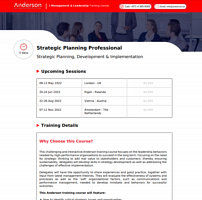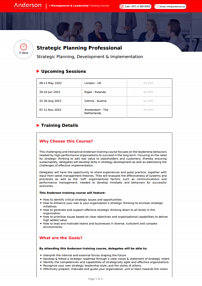- Course Finder
- Formats
- Training Topics
- Business Strategy
- Management & Leadership
- Personal Development Skills
- Innovation & Creativity
- Emotional Intelligence
- Governance and Compliance
- Business & Life Synergy
- Business Agility
- Business Sustainability
- Digital Transformation & Savviness
- Executive & Administrative Support
- Customer Service
- Sales & Marketing
- Human Resource HR Management
- Finance & Budgeting
- Data Science and Protection
- Project Management
- CertNexus
- Special Courses
- 10 Day Seminars
- The Essential Skills
- The Advanced Skills
- The Mini MBA Series
- Bootcamps
- Training Venues
-
- Certificates
- Calendars
- About us
- الدورات العربية
Upcoming Sessions
| 21-25 Oct 2024 | Online | $3,950 |
| 07-11 Jul 2025 | Online | $3,950 |
| 20-24 Oct 2025 | Online | $3,950 |
The training course is also available in Classroom format. Discover the dates
View Classroom formatOnline Training Course Overview
Competencies serve as a reliable guide in various organizational functions, such as performance management, recruitment and selection, and learning and development. They offer clear, objective expectations for employee behavior, eliminating personal bias or prejudice from the equation.
How can competencies contribute to organizational development in critical areas like recruitment and selection, promotion, retention, and performance? This Anderson training course offers comprehensive insights into the what, where, why, and how of competencies and competence frameworks, providing participants with a thorough understanding of their importance and practical applications.
Online Training Course Objectives
By attending this Anderson online training course, delegates will be able to:
- Use competencies to deliver real, qualified improvements in terms of productivity gains by using the techniques in a practical sense
- Understand the integrated process of implementing competency-based HR in your organization by applying the competency framework to basic HR functions, ensuring that the right people are in the right jobs and are developed and motivated in the right way
- Learn how competencies are the key elements in succession planning and the management of values
Designed For
This Anderson online training course is suitable for:
- Those who want to learn the skills involved in improving relations at work, improving productivity or improving behaviour at work
- Those who are responsible for managing or supervising any type of person, group or team
- HR and Employee Relations professionals who are responsible for the design and delivery of competency-based HR programs
Day One: Building the Business Case for Competency Management
- Understanding Competencies in the Organizational Context
- Major Benefits of Competency Management
- Assessment of Competency Management Readiness
- Defining the roles for Senior Management, Managers and HR
- Developing the Competency Project via the DDIR
- Alignment of Corporate Goals with Leadership, Core, Functional and Generic Competencies
Day Two: Designing the Competency Project
- Introducing the DDIR Approach to the Competency Project
- The 4-step approach (DDIR) Checklist
- Adapting a competency framework for use in the value chain of core people related activities
- Defining and linking Competencies for Talent Management parameters
- Defining Core People and HR Activities for Competency Implementation
- Establishing Qualitative and Quantitative Measurements
Day Three: Alignment of Competencies
- Application of Competencies in Recruitment and Selection
- Linking Performance with results – via Behavioural Based Reviews (BBI)
- Defining Competencies for Performance management
- Competencies within the performance management process
- Competency based approach with the Continuous Performance Feedback cycle
- Defining Ratings and Measurements that matter for proven results
Day Four: Talent and Career Management
- The business case for a competency-based approach for Talent Management
- Using Competency Based Assessment Centres for Talent Identification
- Career Management and Succession Planning
- Building effective competency-based Learning and Development frameworks
- Linkages between Motivation, Performance and Results
- ROI from the Competency Framework in core implementations
Day Five: Action Planning for Success
- Review of the Competency Management resolve
- Defining advanced applications of the Competency Framework
- Addressing Challenges with a committed Action Plan for Success
- Creating an effective Communication and Implementation Strategy
- Evaluating the ‘What’s Next’ protocol for sustainability
- Review of Learning and Personal Action Planning
| 10:30 - 11:00 | : | Welcome, Setup, Registration |
| 11:00 – 12:30 | : | First Session |
| 12:30 – 12:45 | : | Break (15 minutes) |
| 12:45 – 14:15 | : | Second Session |
| 14:15 – 14:30 | : | Break (15 minutes) |
| 14:30 – 16:00 | : | Third Session |

- An Anderson e-Certificate will be provided to delegates who attend and complete the online training course
- The HRCI Approved Provider Seal and the corresponding Recertification Credit Hours Awarded will be reflected on the Certificate of Completion
Online Training Course Overview
Competencies serve as a reliable guide in various organizational functions, such as performance management, recruitment and selection, and learning and development. They offer clear, objective expectations for employee behavior, eliminating personal bias or prejudice from the equation.
How can competencies contribute to organizational development in critical areas like recruitment and selection, promotion, retention, and performance? This Anderson training course offers comprehensive insights into the what, where, why, and how of competencies and competence frameworks, providing participants with a thorough understanding of their importance and practical applications.
Online Training Course Objectives
By attending this Anderson online training course, delegates will be able to:
- Use competencies to deliver real, qualified improvements in terms of productivity gains by using the techniques in a practical sense
- Understand the integrated process of implementing competency-based HR in your organization by applying the competency framework to basic HR functions, ensuring that the right people are in the right jobs and are developed and motivated in the right way
- Learn how competencies are the key elements in succession planning and the management of values
Designed For
This Anderson online training course is suitable for:
- Those who want to learn the skills involved in improving relations at work, improving productivity or improving behaviour at work
- Those who are responsible for managing or supervising any type of person, group or team
- HR and Employee Relations professionals who are responsible for the design and delivery of competency-based HR programs
Day One: Building the Business Case for Competency Management
- Understanding Competencies in the Organizational Context
- Major Benefits of Competency Management
- Assessment of Competency Management Readiness
- Defining the roles for Senior Management, Managers and HR
- Developing the Competency Project via the DDIR
- Alignment of Corporate Goals with Leadership, Core, Functional and Generic Competencies
Day Two: Designing the Competency Project
- Introducing the DDIR Approach to the Competency Project
- The 4-step approach (DDIR) Checklist
- Adapting a competency framework for use in the value chain of core people related activities
- Defining and linking Competencies for Talent Management parameters
- Defining Core People and HR Activities for Competency Implementation
- Establishing Qualitative and Quantitative Measurements
Day Three: Alignment of Competencies
- Application of Competencies in Recruitment and Selection
- Linking Performance with results – via Behavioural Based Reviews (BBI)
- Defining Competencies for Performance management
- Competencies within the performance management process
- Competency based approach with the Continuous Performance Feedback cycle
- Defining Ratings and Measurements that matter for proven results
Day Four: Talent and Career Management
- The business case for a competency-based approach for Talent Management
- Using Competency Based Assessment Centres for Talent Identification
- Career Management and Succession Planning
- Building effective competency-based Learning and Development frameworks
- Linkages between Motivation, Performance and Results
- ROI from the Competency Framework in core implementations
Day Five: Action Planning for Success
- Review of the Competency Management resolve
- Defining advanced applications of the Competency Framework
- Addressing Challenges with a committed Action Plan for Success
- Creating an effective Communication and Implementation Strategy
- Evaluating the ‘What’s Next’ protocol for sustainability
- Review of Learning and Personal Action Planning
| 10:30 - 11:00 | : | Welcome, Setup, Registration |
| 11:00 – 12:30 | : | First Session |
| 12:30 – 12:45 | : | Break (15 minutes) |
| 12:45 – 14:15 | : | Second Session |
| 14:15 – 14:30 | : | Break (15 minutes) |
| 14:30 – 16:00 | : | Third Session |
Accreditation

The Certificate
- An Anderson e-Certificate will be provided to delegates who attend and complete the online training course
- The HRCI Approved Provider Seal and the corresponding Recertification Credit Hours Awarded will be reflected on the Certificate of Completion
Info & In-house Solution
For more information about this course, call or email us at:
Call us: +971 4 365 8363

